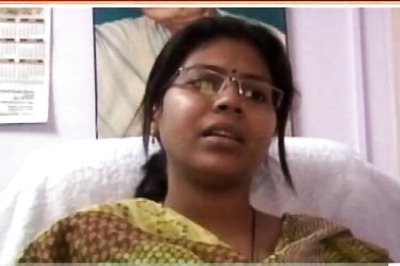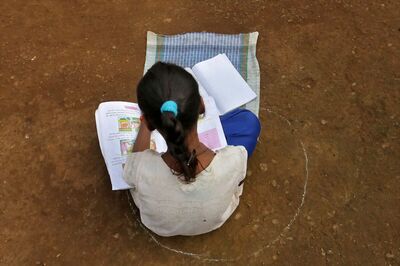
views
Munaki Devi, 55, has a rock protruding out of a hill for a ceiling. Her windows are holes in the old, worn out bedsheet that she hangs on the sides of where she sleeps and spends her days. Munaki, who barely made a living by producing illegal country liquor, has turned into one of the most sought after grocery sellers in her village. And, she says, she owes it to the Bihar chief minister Nitish Kumar.
Just 18 months ago, she spent her days in a nearby hut at Bisunpur village that operates as a makeshift ‘factory’ where she and several other women produced mahua (country liquor).
This village in South Bihar’s Gaya district is mostly occupied by Musahars, categorised as Mahadalits, who fall right at the bottom of the caste hierarchy.
Munaki has no family. Her parents passed away two years after she got married. Fifteen years ago, her husband, who she says was mostly inebriated, abandoned her and left for the city. She has no children. Extreme poverty and caste discrimination forced her to live under a rock.
Now, a walk through the village narrates two prominent realities: the jubilant popularity of Munaki Devi and the despondent poverty in the area. Most women in the village visit her store for their daily needs because they feel, “she will never cheat. She will always provide genuine products because she has been through a lot in her personal life.”
Like thousands of Bihar’s poorest and discriminated women, Munaki is the beneficiary of a statewide programme called Jeevika, co-financed by the World Bank, the state government and the national government through the National Rural Livelihood Mission.
This election season, Munaki has already made up her mind. She is not perturbed by the fact that this is a Lok Sabha election and that Nitish Kumar has allied with the BJP as part of the NDA. “Whenever there will be elections, I will always vote for Nitish Kumar. Whoever his candidate will be from the constituency, I will vote for him/her,” she declares with complete conviction.
Munaki is among the approximately 85 lakh rural women who are part of self-help groups that set aside Rs 10 every week and have collectively saved close to Rs 420 crore. They have also availed loans in excess of Rs, 3,500 crore to set up small businesses ever since the scheme was launched in 2007.
Munaki’s monthly income varies from Rs 6,000 to Rs 7,000, an amount, she explains, “was unimaginable in the recent past.”
Sanjeev Kumar, area co-ordinator for Jeevika in Gaya, explains that “women are shortlisted on the basis of their financial and social conditions. Then they are asked to save Rs 10 every week, prepare a business and a budget plan". He further elaborated that this was done to instil the habit of saving in women. Once Jeevika’s local team is satisfied with the plan, they disburse the loans and help set up these women's entrepreneurial ambitions.
Munaki also goes around the village encouraging women to work. She promises to provide discounts to employed women. “So that we are not dependent on anybody, we must work. Had I been working before, I wouldn’t have to live the way I did after my husband left me,” she says, despair and hope reflecting with equal force in her words.
Bihar’s female labour participation rate is the worst in the country. According to the Census Report of 2011, just 19.1 per cent women participate in the workforce as compared to a national average of 25.5 per cent.
Roughly 90 kilometres away, for 34-year-old Tulsi Devi, the journey of struggle began after marriage. Her husband, a daily-wage labourer, makes Rs 100 to Rs 150 on good days. On other days, the family of five grapples for food.
“My children could only go to school after Jeevika helped me set up my store,” she says. Her monthly income from the store approximates to Rs 4,000 now. Tulsi Devi has two sons and one daughter, all under the age of 10.
The eldest daughter, 9, remembers her days before school and says, “Other children in the village used to have books and school bags which I wanted to own. Since last year I am also going to school. My parents have told me that it was possible only because of Nitish ji.”
Kumar's 14-year tenure is a clear indication that the Bihar chief minister is starting to yield the benefits of the many measures he has taken to nurture his female constituents, cutting across the caste and community lines. To woo this silent constituency, he has introduced a bouquet of schemes: Cycles for girls to go to school; increased representation for women in panchayats and municipal elections, from 33 per cent to 50 per cent; a promise to reserve 35 per cent of all state government jobs for women, in addition to the 35 per cent reserved for them in the police.
This can be partially attributed to the fact that more women in Bihar come out to vote than men. During Lok Sabha elections in 2014, women in 26 out of 42 constituencies accounted for the larger share in voter turnout percentage.
Devesh Kumar, BJP’s state vice-president said Narendra Modi and Nitish Kumar are known to promote the interests of women. “BJP has schemes such as Ujjwala at the central level and the JDU government has always been women-centric in its governance,” he says.
For Mungiya Devi, 38, Kumar has provided with a safe house to live in, apart from helping her husband quit alcohol and taking care of her intellectually disabled son.
Mungiya Devi says Nitish Kumar did the right thing by banning alcohol in Bihar.
“We used to stay in a mud-house which was susceptible to rain and cold. The thatched ceiling would break every monsoon and the cracks in the walls would hardly protect us from cold. My husband would get drunk in the middle of the day and misbehave. Nitish ji did the right thing by banning alcohol and has given me a new life by introducing Jeevika,” she says.
On her journey as a beneficiary, she says Bihar has had a culture of restricting the movement of women. Even in the villages, they were confined to their homes. “I did anot tell my husband that I was saving money and working for Jeevika. He would have dismissed it. Later, when I received the loan and got the store set up, he came to know. With more money coming in, he did not object. I can take care of my son and husband,” she narrates.



















Comments
0 comment